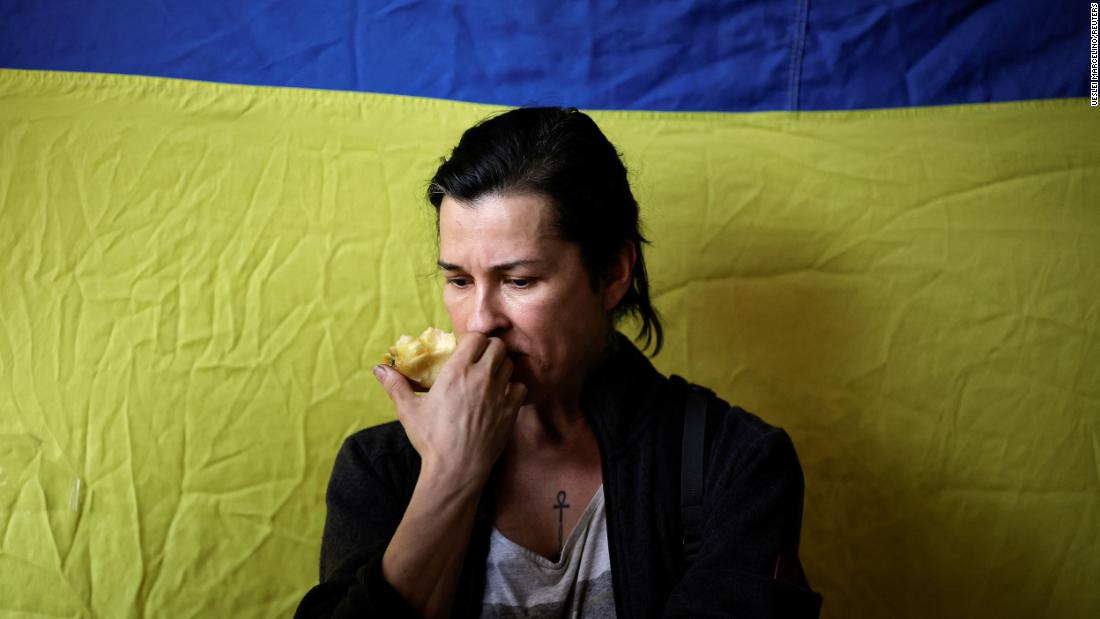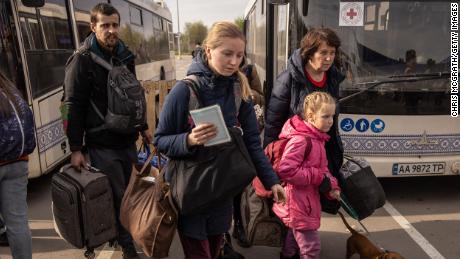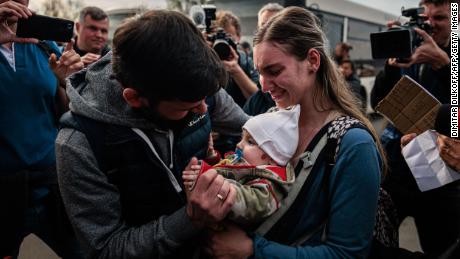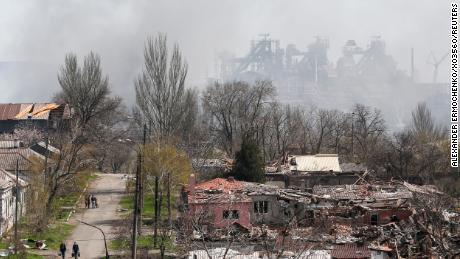
After getting off the buses, evacuees headed to tents that the Ukrainian government has set up to help them with the next part of their journey.
Ukrainian President Volodymyr Zelensky said in his nightly address on Tuesday that 156 people arrived to Zaporizhzhia from the plant and surrounding areas in Mariupol by evacuation corridors.
“I am grateful to all of those on whom the salvation of these people depended. Who agreed and who helped. I am grateful to everyone who provided physical movement of people through the humanitarian corridor,” he said.
CNN spoke to some of the evacuees as they arrived.
An elderly woman who emerged from a bus was carrying small amounts of medicine, a plastic cup, a toothbrush, a tissue paper — the things she was living off over the past weeks.
“I have nobody here. I don’t know where to go now,” she told CNN.
She had been sheltering underground in Azovstal for weeks and appeared exhausted. She had been living in the dark, and still had a head torch draped around her neck. She was having some difficulty seeing in the bright daylight.
“An immense relief”
Many of the evacuees appeared overwhelmed, exhausted, pale and thin, but also relieved to be safe.
Elina Tsybulchenko, a former employee at the plant, said she was in a bunker there with her family from March 2 until May 1.
They survived on soup and tinned food and unsweetened tea — but not much of it, she said.
She told CNN that when they left, there were still 42 people — civilians — left in their bunker.
Speaking of the bombing, Tsybulchenko said, “I never thought the earth could shake like that. It didn’t just shake. The bunker jumped and trembled.”
“Mariupol was my city, but now it is gone, there is nothing,” she said.
Tsybulchenko said that she lost precious family heirlooms, including a 150-year-old traditional embroidered costume.
“It survived the Holodomor [Stalin’s policy of collectivization that led to the Great Famine, where millions of Ukrainians died of starvation], deportation, World War I, World War II — even the Nazis did not destroy it. And the fascists did not destroy Mariupol. But the Russians came and destroyed it,” she said.
The family had three apartments, she said. “And it all burned down, everything burned down.”
On the way to Zaporizhzhia, Tsybulchenko said she started to cry when she saw the Ukrainian flag.
Sergey Kuzmenko, an Azovstal employee who had been at the plant since March 8, described the conditions in the bunker as damp and without ventilation.
“People rot in basements,” he said, “…there is dampness, there is no ventilation.”
“At the beginning of the war, the plant had 36 bomb shelters. But at the moment there are only a few left,” he added.
Kuzmenko said as he left the plant, he saw that two floors of their bunker were full of badly wounded soldiers.
Russian troops searched through all his belongings after he was evacuated and he was examined for tattoos, he said. “They offered options to return to Zaporizhzhia, or go to Russia or stay in the DPR. Some stayed in Russia. They didn’t force them.”
Kuzmenko described a tortuous journey with many stops and detours. He said the evacuees were aware that hundreds of people they passed could not join the convoy, including about 500 waiting at a shopping center outside Mariupol and at villages along the way.
UN’s Humanitarian Coordinator in Ukraine Osnat Lubrani said in a statement, “Seeing a 6-month-old boy playing with a straw of grass, his delighted mother told me this is the first time in his life he has been able to do that. I saw the tears of joy as family members trapped in different parts of the plant for two months were reunited.”
The evacuation from Azovstal was brokered and organized by the UN and International Red Cross (ICRC).
“It is an immense relief that some civilians who have suffered for weeks are now out,” said ICRC President Peter Maurer Tuesday.
“The ICRC hasn’t forgotten the people who are still there, nor those in other areas affected by the hostilities or those in dire need of humanitarian relief, wherever they are. We will not spare any effort to reach them.”
On Tuesday evening, Zelensky said that he will “continue to do everything to get all our people out of Mariupol and Azovstal. It’s difficult. But we need everyone who stays there: civilians and soldiers.”
He also accused Russian troops of not adhering to the ceasefire and continuing strikes on the Azovstal plant.


